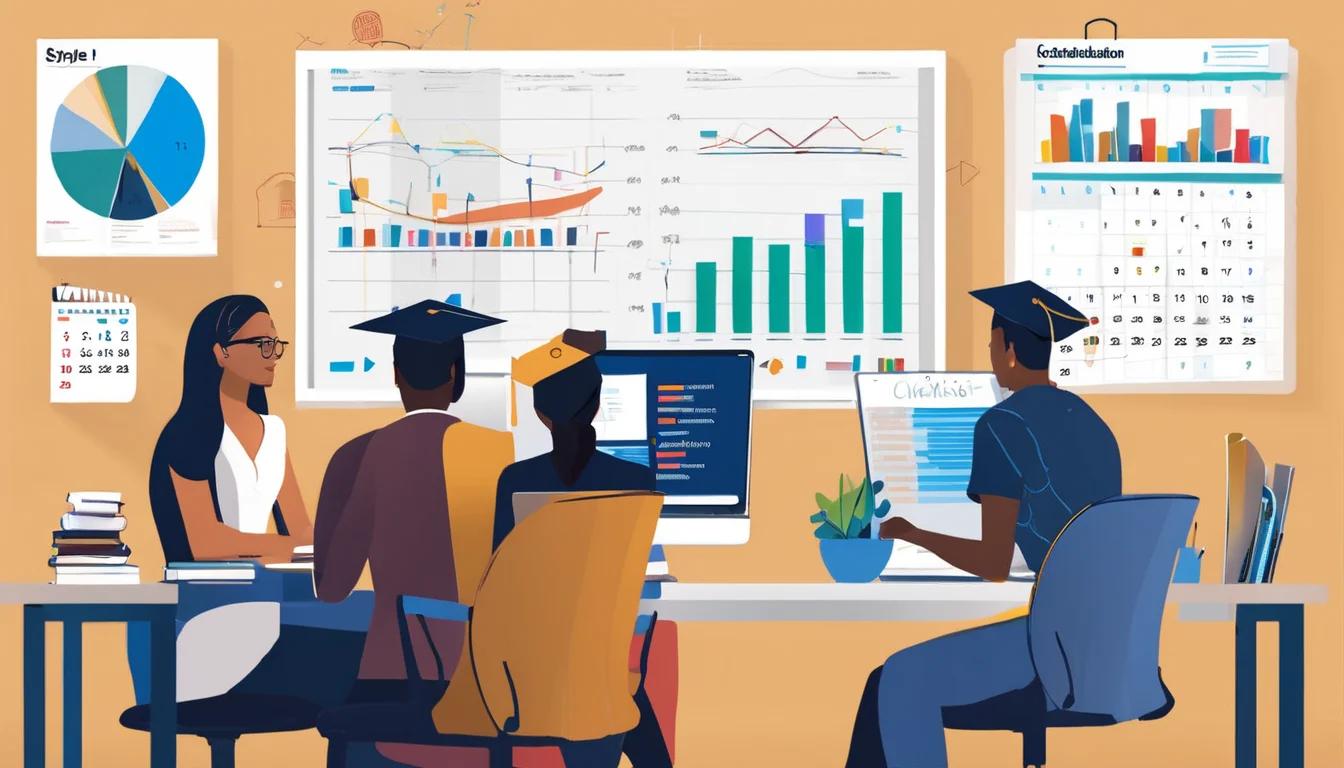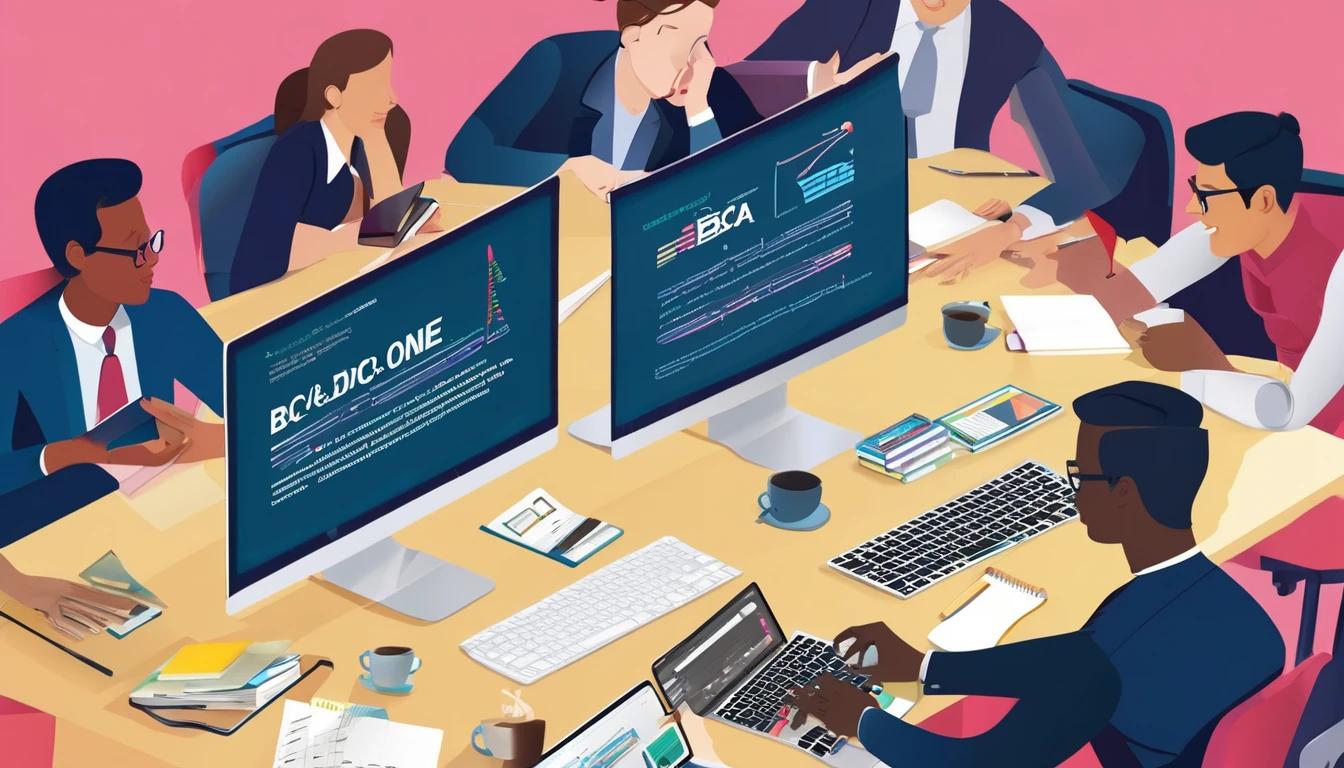UG/PG/Diploma Online Degrees: Affordable MBAs, BCAs, MCAs for Career Growth

You’re excited to take the next big step, but there’s a lot to unpack: programs, fees, career outcomes, and the million-dollar question—how do you choose the right university without second-guessing yourself? If that sounds like you, you’re in the right place. I’ve helped countless learners compare options and land in programs they love, and in this guide, I’ll walk you through the same process—step by step.
Whether you’re aiming for an online MBA, a tech-focused master’s, or a flexible undergraduate program, we’ll break everything down in simple, practical terms. By the end, you’ll know exactly how to shortlist universities, estimate total costs, and plan for a career boost—without the overwhelm.
Who is this guide for?
- Working professionals balancing a job and upskilling.
- Fresh graduates deciding between on-campus and online degrees.
- Career switchers looking to pivot into tech, business, analytics, or media.
- Parents and professionals returning to learning after a break.
What you’ll learn
- How to compare universities beyond just brand name.
- What fees, scholarships, and ROI realistically look like.
- Eligibility, required documents, and a smooth application timeline.
- The differences between online, distance, and on-campus learning—and which suits you.
- Time-management tips to study without burning out.
Start with clarity: define your goal
Ever wondered why some students thrive while others feel stuck mid-semester? It often comes down to clarity. Before you browse 20 tabs, ask yourself:
- What problem am I solving? (Career growth, salary hike, role change, credibility)
- What skills do I need next? (Leadership, analytics, cloud, UX, communication)
- How much time can I realistically commit per week?
- What’s my total budget—including hidden costs like exam fees or travel?
A quick story: Rahul, a marketing executive, spent three months comparing fancy options. Once we mapped his goal—transitioning into product marketing—he shortlisted three programs with strong product-centric modules and alumni in tech. He finished in 18 months and doubled his responsibilities in his role. Focus beats FOMO, every time.
How to compare universities the smart way
Instead of relying on flashy ads or random rankings, use this practical checklist. Score each university out of 5 on every factor (you can even use a simple spreadsheet):
- Accreditation and approvals: Look for recognition from bodies like UGC, AICTE, or NAAC (India) and equivalent authorities in your country.
- Curriculum relevance: Up-to-date syllabus with industry projects, case studies, and capstones.
- Faculty and mentors: Industry experience matters as much as academic qualifications.
- Flexibility: Recorded vs live classes, weekend sessions, exam modes, and reattempt policies.
- Student support: Dedicated mentor/counsellor, doubt-clearing, career cell, networking events.
- Technology: User-friendly LMS, mobile app, downloadable lectures, closed captions.
- Alumni outcomes: Roles, companies, and average salaries—not just names on a brochure.
- Transparency: Clear fee breakdown, refund policy, and sample lectures before enrolling.
Fees, ROI, and realistic salary outcomes
Let’s bring numbers into the picture. Here’s an indicative snapshot to help you benchmark (figures are examples and vary by university and city):
| Program | Duration | Approx Annual Fees (INR) | Total Cost (INR) | Avg Starting Salary (INR) | ROI Timeline |
|---|---|---|---|---|---|
| Online BBA (General) | 3 years | 60,000 - 90,000 | 1.8L - 2.7L | 3.0L - 4.5L | 12 - 24 months after graduation |
| Online MCA (Data/Cloud) | 2 years | 80,000 - 1.5L | 1.6L - 3.0L | 5.5L - 9.0L | 6 - 18 months post-completion |
| Online MBA (Marketing/Finance/BA) | 2 years | 1.0L - 2.5L | 2.0L - 5.0L | 7.0L - 14.0L | 6 - 24 months depending on experience |
| Online MA (Journalism & Communication) | 2 years | 60,000 - 1.2L | 1.2L - 2.4L | 4.0L - 6.5L | 12 - 24 months |
Tip: ROI accelerates if you build a public portfolio—case studies, GitHub, Medium posts, or LinkedIn projects—during the program. Recruiters love proof of work.
Eligibility and required documents
Most universities follow similar criteria, with slight variations. Here’s a quick overview:
| Program Type | Eligibility | Entrance/Interview | Work Experience |
|---|---|---|---|
| Undergraduate (BBA/BCA/BA) | 10+2 from a recognized board | Usually no; some ask for English proficiency | Not required |
| Postgraduate (MBA/MA/MCom) | Bachelor's degree with min 45-50% (varies) | May require test/interview for specializations | Preferred for MBA, not mandatory |
| Technical Masters (MCA/MSc IT) | Relevant UG degree; some accept any UG with Math/Stats | Basic aptitude/subject tests at times | Not required |
Documents you’ll likely need:
- Government ID and recent photos
- 10th, 12th, and graduation mark sheets
- Provisional/degree certificate
- Transfer/migration certificate (if asked)
- Work experience letters (if applicable)
- Category certificates for scholarships/quotas (if applicable)
Online vs distance vs on-campus: which suits you?
Not all flexible programs are the same. Here’s a side-by-side view to help you decide:
| Feature | Online Learning | Distance Learning | On-Campus |
|---|---|---|---|
| Class Delivery | Live + recorded sessions via LMS | Self-paced with printed/soft materials | In-person classes |
| Interaction | High (live chats, mentor calls) | Low to moderate | High |
| Flexibility | Very high | High | Moderate |
| Networking | Virtual events, alumni groups | Limited | Strong, in-person clubs |
| Cost | Moderate | Lower | Highest |
| Best For | Working professionals | Self-starters | Campus experience seekers |
If you thrive with structure and feedback, online wins. If you’re extremely self-disciplined and cost-sensitive, distance can work. If you want labs, studios, or campus life, on-campus is worth the premium.
Real-world success story
Aditi had 4 years in operations and felt capped at her role. She chose an online MBA with a strong business analytics specialization and stuck to a weekend study routine—Friday nights for recorded lectures, Sundays for assignments. She also shared one case study a week on LinkedIn. By month 10, a recruiter reached out for a business analyst role. She graduated, switched domains, and got a 40% hike. The secret wasn’t just the degree—the visibility and consistency made the difference.
Must-have features in a great online program
- Industry-led modules: Projects with real datasets, marketing plans, or mock product roadmaps.
- Assessments that mimic work tasks: Presentations, dashboards, code repos, campaign plans.
- Mentorship: 1:1 or group mentoring with industry professionals.
- Capstone + portfolio: Something you can showcase in interviews.
- Career support: Resume clinics, mock interviews, job boards, alumni connects.
- Transparent policies: Easy deferment, clear exam rules, and support SLAs.
Time management: study without burning out
Juggling work and study is a skill—and it’s learnable. Try this simple framework:
- Block the big rocks: Reserve 2 fixed slots weekly (e.g., Wed 8-10 PM, Sun 10-1 PM).
- Adopt a two-pass method: First pass for watch/skim, second pass for notes and practice.
- Use 30-minute sprints: A timer + no phone equals high-quality focus.
- Automate the boring: Calendar reminders, to-do templates, flashcards.
- Build a micro-peer group: 3-5 classmates for accountability and quick doubts.
- Protect downtime: Rest is part of the plan—burnout kills consistency.
Scholarships and financing
Financing doesn’t have to be stressful. Explore these options early:
- Merit scholarships: Based on past academics or entrance scores.
- Diversity/need-based grants: Often for women, veterans, or underrepresented groups.
- Employer sponsorship: Full or partial; propose an ROI plan tied to your role.
- No-cost EMI or low-interest loans: Check total cost and any hidden charges.
- Early-bird waivers: Deadlines matter—set calendar alerts.
Application timeline: a simple roadmap
- Weeks 1-2: Clarify your goal and shortlist 4-6 programs.
- Weeks 3-4: Attend webinars, request sample lectures, talk to alumni.
- Weeks 5-6: Prepare documents, update resume, write SOP.
- Weeks 7-8: Apply to 2-3 best-fit programs in the same intake.
- Weeks 9-10: Compare offers, finalize fees/EMI, and enroll.
- Weeks 11-12: Set up your study system: timetable, apps, and a dedicated corner.
Top specializations and where they shine
- MBA (Business Analytics): For data-driven roles like business analyst, product analyst, growth analyst.
- MBA (Marketing/Brand): For digital marketing, brand strategy, performance marketing, product marketing.
- MBA (Finance): For corporate finance, FP&A, fintech roles, credit analysis.
- MCA/CS/IT: For software engineering, data engineering, cloud, DevOps.
- MA (Communication/Journalism): For PR, content strategy, brand communications, media analysis.
Common pitfalls to avoid
- Choosing only by brand name: Fit and curriculum matter more than hype.
- Underestimating workload: Plan for 8-12 study hours/week for most PG programs.
- Ignoring alumni: A 15-minute alumni call can save you from months of regret.
- Forgetting hidden costs: Exam fees, project fees, and certification add-ons.
- Not building a portfolio: Your degree opens doors; your work gets you hired.
FAQs
Is an online degree valued by employers?
Yes—especially when it’s from a recognized university with proper approvals and you can showcase skills through projects and internships. Employers increasingly care about what you can do, not just where you studied.
How do I check if a program is recognized?
Look for official approvals/accreditations on the university’s website and verify with the respective regulatory bodies in your country. When in doubt, ask for documentation.
Can I switch specializations midway?
Some universities allow changes within the first semester or before specialization modules start. Ask about the policy before enrolling.
Will I get placement support?
Many programs offer career services, but they differ widely. Clarify what is provided: resume help, mock interviews, job boards, or direct hiring drives.
What if I take a study break?
Check deferment and re-attempt policies. Programs with flexible re-enrollment windows are a lifesaver during busy work seasons.
Your next step
You don’t need the perfect choice—you need the right next step for your goals. Shortlist three programs today, book a webinar or sample class, and talk to at least one alum from each. That single action will bring more clarity than hours of passive browsing.
If you want a hand comparing fees, curriculum, and outcomes side-by-side, I’m here to help. Drop your questions, share your shortlist, or tell me your career goal—I’ll help you narrow it to a confident yes.
Ready to begin? Let’s turn your ambition into a plan you can act on this week.


